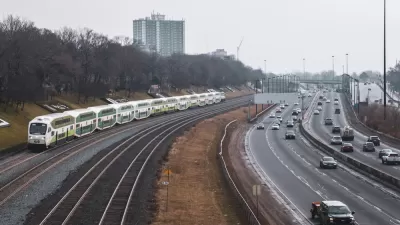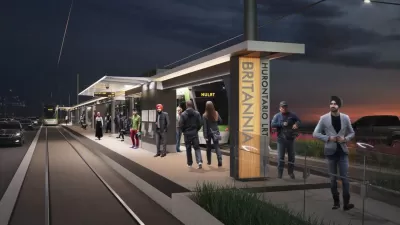This week, the Toronto region's transportation agency floated a strategy for how to fund the wildly ambitious 25-year transportation plan know as the Big Move. A combination of new taxes and fees are expected to yield $2 billion per year.
"It will cost the average Toronto region household an additional $477 a year in taxes to overcome a generation of public transit neglect and crippling road congestion under a transit investment strategy being unveiled by Metrolinx on Monday," reports Tess Kalinowski. "The Toronto Star has learned that the provincial transportation agency is recommending a 1 per cent sales tax, 5-cent/litre gas tax, a 25-cent-per-day non-residential parking levy and a 15 per cent hike in development charges to raise just over $2 billion annually."
"That’s the cost of building the Metrolinx 25-year, $50-billion Big Move transportation plan. It calls for more than triple the region’s 500 km of rapid transit to about 1,700 km and would put a transit stop within 2 km of 75 per cent of residents."
In an article in Torontoist, Steve Munro takes a deep look at the history and details behind Metrolinx's Investment Strategy [PDF]. He also ruminates on its prognosis for passage. "Metrolinx and Queen’s Park face a considerable political challenge in convincing Ontario residents that new taxes will bring meaningful, timely improvements to their travel experience. Polls and community meetings suggest that everyone—including the business community—accepts the need for greater transit spending, but the preferred source is often 'anyone but me.'”
"The new taxes will place varying burdens on different groups, but these will be eventually offset by the transfer of personal expenses (eliminating a second or third car, reducing the time needed to commute) to public ones. That 'eventually' is the nub of Metrolinx’s problem. Voters will pay for many years before they benefit from better transit, and those years must see plans and funding survive swings in government policy and economic activity."
"In its staging plan, Metrolinx must show how improvements will be felt in the near and medium term, not just in a hypothetical future where all of The Big Move is in operation."
FULL STORY: Metrolinx backs hikes in HST, gas tax and new parking levy

Maui's Vacation Rental Debate Turns Ugly
Verbal attacks, misinformation campaigns and fistfights plague a high-stakes debate to convert thousands of vacation rentals into long-term housing.

Planetizen Federal Action Tracker
A weekly monitor of how Trump’s orders and actions are impacting planners and planning in America.

San Francisco Suspends Traffic Calming Amidst Record Deaths
Citing “a challenging fiscal landscape,” the city will cease the program on the heels of 42 traffic deaths, including 24 pedestrians.

Defunct Pittsburgh Power Plant to Become Residential Tower
A decommissioned steam heat plant will be redeveloped into almost 100 affordable housing units.

Trump Prompts Restructuring of Transportation Research Board in “Unprecedented Overreach”
The TRB has eliminated more than half of its committees including those focused on climate, equity, and cities.

Amtrak Rolls Out New Orleans to Alabama “Mardi Gras” Train
The new service will operate morning and evening departures between Mobile and New Orleans.
Urban Design for Planners 1: Software Tools
This six-course series explores essential urban design concepts using open source software and equips planners with the tools they need to participate fully in the urban design process.
Planning for Universal Design
Learn the tools for implementing Universal Design in planning regulations.
Heyer Gruel & Associates PA
JM Goldson LLC
Custer County Colorado
City of Camden Redevelopment Agency
City of Astoria
Transportation Research & Education Center (TREC) at Portland State University
Jefferson Parish Government
Camden Redevelopment Agency
City of Claremont




























